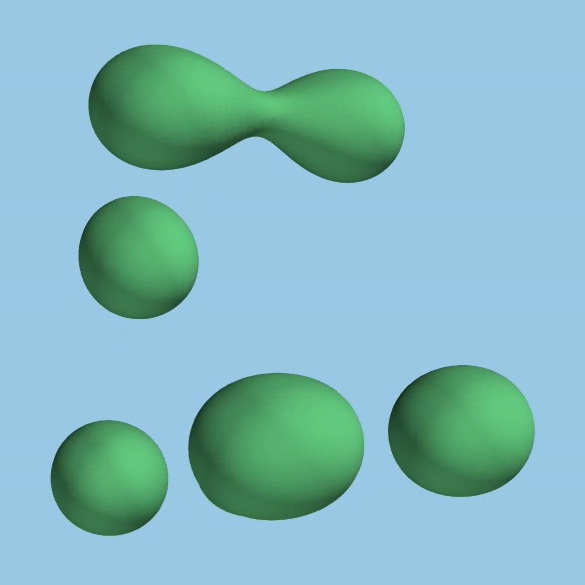The physics of droplets inside cells
Wann
Mittwoch, 9. Oktober 2024
11:45 bis 13:15 Uhr
Wo
P 712
Veranstaltet von
S. Karpitschka
Vortragende Person/Vortragende Personen:
Dr. David Zwicker, Max-Planck-Institut für Dynamik und Selbstorganisation, Göttingen
Droplets spontaneously concentrate material and can thus structure systems spatially. This is crucial inside biological cells, where biomolecular condensates partition the complex interior without using lipid membranes. The compositions of these biological droplets are mainly controlled by genetically encoded interactions. Yet, the droplets also need to form at the right time, at the right position, and with the right size to fulfill countless cellular functions. In my talk, I will explain why cells use droplets and how they control them. In particular, I will show that the non-equilibrium nature of living systems can lead to surprising behaviors, like their spontaneous division of droplets. Moreover, I will touch upon the complexity of the multicomponent mixture of the cytosol, and I will explain how the mechanical properties of the environment affect droplet growth. Taken together, I will thus present various physical principles that cells can use to control droplets for cellular processes. Studying these systems might also help us design smart materials in the future.

The physics of droplets inside cells
Wann
Mittwoch, 9. Oktober 2024
11:45 bis 13:15 Uhr
Wo
P 712
Veranstaltet von
S. Karpitschka
Vortragende Person/Vortragende Personen:
Dr. David Zwicker, Max-Planck-Institut für Dynamik und Selbstorganisation, Göttingen
Droplets spontaneously concentrate material and can thus structure systems spatially. This is crucial inside biological cells, where biomolecular condensates partition the complex interior without using lipid membranes. The compositions of these biological droplets are mainly controlled by genetically encoded interactions. Yet, the droplets also need to form at the right time, at the right position, and with the right size to fulfill countless cellular functions. In my talk, I will explain why cells use droplets and how they control them. In particular, I will show that the non-equilibrium nature of living systems can lead to surprising behaviors, like their spontaneous division of droplets. Moreover, I will touch upon the complexity of the multicomponent mixture of the cytosol, and I will explain how the mechanical properties of the environment affect droplet growth. Taken together, I will thus present various physical principles that cells can use to control droplets for cellular processes. Studying these systems might also help us design smart materials in the future.

The physics of droplets inside cells
Wann
Mittwoch, 9. Oktober 2024
11:45 bis 13:15 Uhr
Wo
P 712
Veranstaltet von
S. Karpitschka
Vortragende Person/Vortragende Personen:
Dr. David Zwicker, Max-Planck-Institut für Dynamik und Selbstorganisation, Göttingen
Droplets spontaneously concentrate material and can thus structure systems spatially. This is crucial inside biological cells, where biomolecular condensates partition the complex interior without using lipid membranes. The compositions of these biological droplets are mainly controlled by genetically encoded interactions. Yet, the droplets also need to form at the right time, at the right position, and with the right size to fulfill countless cellular functions. In my talk, I will explain why cells use droplets and how they control them. In particular, I will show that the non-equilibrium nature of living systems can lead to surprising behaviors, like their spontaneous division of droplets. Moreover, I will touch upon the complexity of the multicomponent mixture of the cytosol, and I will explain how the mechanical properties of the environment affect droplet growth. Taken together, I will thus present various physical principles that cells can use to control droplets for cellular processes. Studying these systems might also help us design smart materials in the future.

